Israel's Gantz Sees Possible Attack On Iran 'In Two Or Three Years'
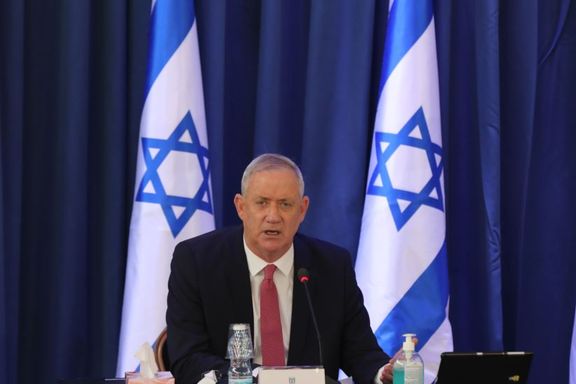
Israel could attack Iranian nuclear sites in two or three years, its defense minister said Wednesday, in unusually explicit comments about a possible timeline.

Israel could attack Iranian nuclear sites in two or three years, its defense minister said Wednesday, in unusually explicit comments about a possible timeline.
With international efforts to renew the 2015 nuclear deal (JCPOA) having stalled, the Iranians have ramped up uranium enrichment, a process that can eventually yield fuel for nuclear bombs - though they deny having any such design.
Experts say Iran could potentially raise the fissile purity of its uranium to weapons-grade in short order. But building a deliverable warhead would take it years, they say - an estimate echoed by an Israeli military intelligence general this month.
"In two or three years, you may be traversing the skies eastward and taking part in an attack on nuclear sites in Iran," Defense Minister Benny Gantz told graduating air force cadets in a speech.
For more than a decade, Israel has issued veiled threats to attack its arch-enemy's nuclear facilities if it deems world powers' diplomacy with Tehran a dead end. However, some experts doubt Israel has the military clout to deliver lasting damage to Iranian targets that are distant, dispersed and well-defended.
The Israeli military intelligence forecast for 2023 is that Iran "will continue on its current path of slow progress" in the nuclear realm, according to Israel Hayom newspaper on Sunday.
"Iran will only change its policies if extreme sanctions are imposed on it; then it could decide to accelerate enrichment to military grade," said the report, which a military spokesperson confirmed as citing genuine intelligence assessments.

In January 2022, world powers were in talks aiming to revive the 2015 Iran nuclear deal. The year ends with the powers in dispute at the UN Security Council.
Back in January, there was “no alternative to dialogue,” tweeted German Foreign Minister Annalena Baerbock in Washington. “Political decisions are needed now,” wrote Enrique Mora, the senior European Union official chairing the talks in Vienna aimed at restoring the JCPOA (Joint Comprehensive Plan of Action).
Iranian foreign minister Hossein Amir-Abdollahian agreed the talks were at a point where “we have to make a political decision.” Brett McGurk, a leading US security official, saw a “culmination point…pretty soon.”
But whatever political decisions were – or weren’t – taken, neither the Vienna process, paused in March, nor subsequent indirect US-Iran meetings were enough to bridge gaps, despite continued Iran-US message exchanges until at least September. While Iran reportedly dropped a condition that its Revolutionary Guards be removed from a US list of ‘foreign terrorist organizations,’ it continued to insist on ‘guarantees’ to cushion its economy and nuclear program from the US again leaving the JCPOA.
The Biden administration continued to apply ‘maximum pressure’ sanctions, in November sanctioning 13 companies from mainland China, Hong Kong and the United Arab Emirates, over alleged involvement in selling Iranian petrochemicals in East Asia. Tehran continued expanding its nuclear program beyond JCPOA limits, employing more advanced centrifuges to expand its stockpiles of uranium enriched up to 60 percent.
While the International Atomic Energy Agency (IAEA) reported regularly on Iran’s program, its access remained at a lower level than under the JCPOA. Tehran enforced a law passed by parliament in December 2020 after scientist Mohsen Fakhrizadeh was killed, so reducing agency monitoring roughly to that required under the Nuclear Non-Proliferation Treaty.
October: Involving the Security Council
The JCPOA reached the United Nations Security Council (UNSC) in October as France, the United Kingdom and the US argued Iran and Russia were violating UNSC Resolution 2231, which endorsed the JCPOA in 2015. The three argued that Russia’s use of Iranian military drones violated a clause restricting Iran trading some categories of weapons – an argument Tehran rejected.
This was a shift in the French and UK positions, bring them closer to the US than when in 2021 the E3 – France, Germany and the UK – rejected, on the grounds Washington had left the JCPOA, an US attempt to move UN sanctions against Iran for violating the 2015 agreement.
But this widened the gap with China and Russia. Geng Shuang, Beijing’s deputy permanent representative at the UN, told the UNSC December 19 that as the “the creator of the Iranian nuclear crisis…the US should recognize its responsibility and take the lead in taking practical measures.” Geng said that pressuring Iran would “escalate conflict, undermine trust and cast a shadow over the negotiations.”
Both Russia and China voted against motions in June and November at the 35-nation board of the International Atomic Energy Agency censuring Tehran over an agency enquiry into uranium traces found at undeclared sights, saying the vote would merely make matters worse.
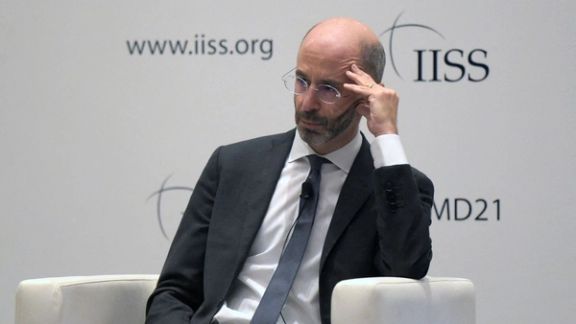
Talks ‘no longer our focus’
By October, US officials, including special envoy Rob Malley, said JCPOA revival was no longer their “focus.” President Joe Biden said Washington was instead “shining a spotlight” on protests in Iran – so rejecting the logic underlying the JCPOA of isolating the nuclear issue. The US, the European Union and the UK all introduced sanctions on Iranian officials over gross violation of human rights during the deadly suppression of protests and over supplying drones to Russia.
Opponents of the JCPOA have ended 2022 in high spirits, nowhere more so than in Israel where Benjamin Netanyahu - whose warning over Iran go back to 1996 when he told the US Congress Tehran was “extremely close” to a nuclear weapons - is preparing to return to power in coalition with three far-right parties.
But some analysts have argued that new thinking is needed to restore momentum for non-proliferation. In November the Washington-based Arms Control Association called for a ‘plan B’ based on “confidence-building steps by the United States and Iran to prevent further escalation...”
In the Washington Post December 1, Ellie Geranmayeh, of the European Council on Foreign Relations, rejected widening sanctions that had led Iran to escalate, arguing for “an active diplomacy track… before it is too late.” She called for “step-by-step measures” to at least freeze Iran’s nuclear program and improve IAEA access in return for “humanitarian economic relief” and eased “sanctions enforcement against third parties trading with Iran, such as those in Iraq, the United Arab Emirates and China.”
But given the prevailing atmosphere amid government violence that has killed 500 protesters and supply of weapons to Russia, tensions with Iran are no longer just over the nuclear issue.
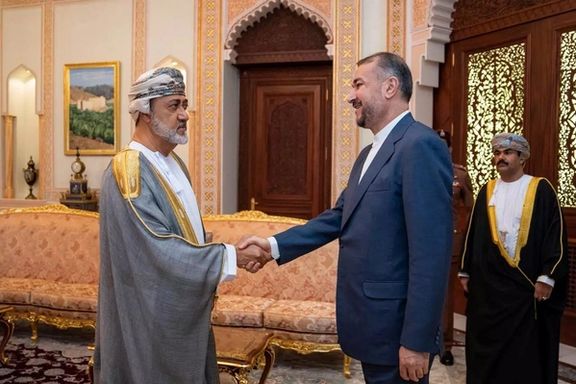
The Iranian foreign minister’s Oman visit reflects continuing regional diplomacy over the Iran nuclear agreement, trade, Yemen, and Arab relations with Israel.
Hossein Amir-Abdollahian met Wednesday in Muscat with the Omani Sultan Haitham bin Tariq, calling Oman the “epicenter” of regional talks. With Yemen, Afghanistan, and Ukraine all on the agenda, the minister said these issues had to be addressed “at a faster pace.”
There is speculation, encouraged by phone calls between Amir-Abdollahian and his Omani counterpart December 22, that Muscat has a role in restoring the 2015 Iran nuclear agreement, the JCPOA (Joint Comprehensive Plan of Action). Muscat’s mediation goes back to facilitating secret Iran-United States contacts before the 2015 deal. European Union spokesman Peter Stano December 26 explained Amir-Abdollahian’s meeting in Jordan December 20 with EU foreign policy chief Joseph Borrell’s as “moving talks about JCPOA revival forward.”
Omani mediators have also been in Sanaa trying to bridge gaps between the government of Rashid al-Alimi and the main opposition Ansar Allah, known as the Houthis, over extending the fragile eight-month ceasefire. Iran has given some support to Ansar Allah, while Saudi Arabia began in 2015 direct military involvement, mainly with its air force.
Reports said the Omanis left December 25 without resolving differences as to whether the government or Ansar Allah should pay fighters and state employees in the third of Yemen, including 80 percent of the population, under Ansar Allah’s control. At least 370,000 people have died in the eight-year conflict, which began with protests against then president Ali Abdullah Saleh. The United Nations says a child is dying every ten minutes from preventable causes.
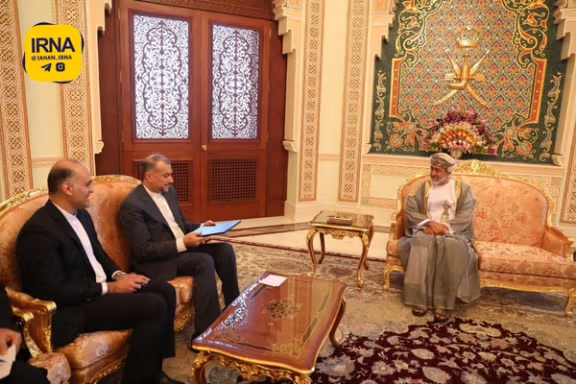
Keen to see the JCPOA restored, Oman has distanced itself from any push towards ‘normalization’ with Israel through extending the 2020 US-brokered ‘Abrahamic accords,’ which were widely portrayed in the US as a move against Iran. After the critical reaction of Arab football fans to Israeli journalists in December’s World Cup, and with a new Israeli government including far-right parties committed to speeding up Jewish settlements in occupied land, Muscat is mulling legislation similar to laws passed in Iraq and Kuwait sanctioning trade with Israel.
“Anything related to Israel-Saudi relations outside of security matters…has largely left the Saudi media,” the Jerusalem Post noted Wednesday. “Oman never had any serious intention of joining [the Abrahamic accords].”
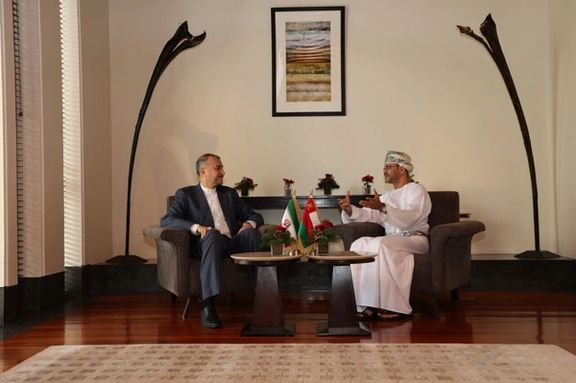
Expanding trade, ‘friends with all’
Iranian regional diplomacy is pushing both the need for dialogue and expanding trade. Both were discussed at the ‘Baghdad 2’ conference December 20-21, where an Iranian delegation led by Amir-Abdollahian met with leading officials and politicians from Turkey, Saudi Arabia, Qatar, the United Arab Emirates, Kuwait, Bahrain, Oman, Egypt, France, Iraq, Jordan, and the EU.
Critical reaction in Tehran was fairly muted to a joint statement issued after the December 9 Arab-China summit where Riyadh and Beijing agreed “joint cooperation to ensure the peaceful nature of Iran’s nuclear program.” Business Insider noted December 20 that many could see that “Beijing would rather balance its relationship with regional competitors,” pursuing “a friends-with-all approach” that both expands $87-billion bilateral trade with the Saudis and also pursues, despite US sanctions, the 2021 25-year cooperation agreement with Iran envisaging potentially $400-billion Chinese investment in exchange for stable, discounted oil supplies.
Oman faces greater difficulties in two gas projects with Iran, one to supply 10 billion cubic meters/year of Iranian gas over 15 years, and one as a conduit for a 1400km, $7-billion pipeline from Iran to India for 11.3bm3/year, for which New Delhi signed a memorandum-of-understanding with Russia’s Gazprom in 2019.
However, neither Iran nor Oman has the technology to lay deep-sea pipelines and the long-delayed project needs Western technology, which in turn needs the lifting of US sanctions.
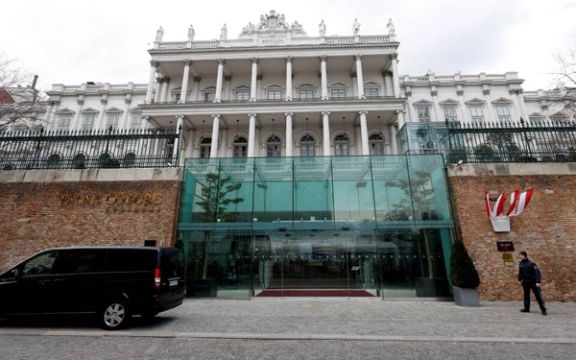
Israeli officials say that the White House is still seeking to reach a nuclear deal with Iran despite the comments by President Joe Biden who said earlier the deal is “dead”.
Israeli daily Haaretz wrote Tuesday that Israeli officials believe the Biden administration is still aiming to reach a nuclear agreement with the Islamic Republic and has the support of the US defense establishment while the recently emerged footage showing President Biden saying the deal was “dead” has gone viral on social media.
In this video, the US President confirmed that the deal was “dead”, but he said he could not announce it officially for “a lot of reasons”.
Biden did not give a direct answer about the “reasons” why Washington refuses to officially announce this. Israeli officials say this might have been a slip of the tongue by Biden.
Israeli officials quoted by Haaretz claim that Washington knows it will be difficult for the Iranian regime to suppress the recent protests without improving the economic situation and therefore concluding the deal may be in their interest.
These officials who have been in touch with their US counterparts have also given the impression that despite the challenging situation, a significant twist in the nuclear deal was coming within in a few months.
However, an Israeli official told Haaretz that “Israel has no practical capacity to attack Iran effectively without the support and cooperation of the US, and anyone who says otherwise is willfully lying.”
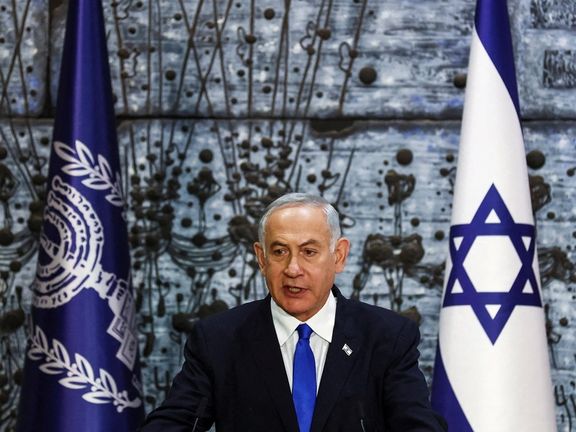
The Israeli media have reported that negotiations between Israel, the United States and Saudi Arabia to normalize ties between Jerusalem and Riyadh are underway.
The Hebrew daily Yediot Aharonot said over the weekend that talks were underway between Israel, the United States and Saudi Arabia with respect to a normalization deal between the Jewish state and the most important Persian Gulf Arab country.
Such an agreement would make Saudi Arabia the fifth Arab state to normalize ties with Israel under the 2020 Abraham Accords.
The UAE, Bahrain, Morocco, and Sudan normalized ties with Israel in exchange for its suspension of plans to annex West Bank settlements. Netanyahu would similarly suspend plans for annexation in exchange for a Saudi deal as well, Yediot Ahronot said.
In an interview with Jewish Insider Friday the Israeli Prime Minister said, “I hope to bring about a full, formal peace as we’ve done with the other Gulf states like Bahrain and the United Arab Emirates.”
He further noted that “It’s up to the Saudi leadership to decide that. I hope they will. And I intend to explore that alongside my other main goals. This is a very important goal, because if we have peace with Saudi Arabia, we are effectively going to bring an end to the Arab-Israeli conflict.”
The so-called Abraham Accords, implemented by Benjamin Netanyahu during the Donald Trump administration in 2020, brought peace between Israel and the United Arab Emirates, Bahrain, Morocco and Sudan.
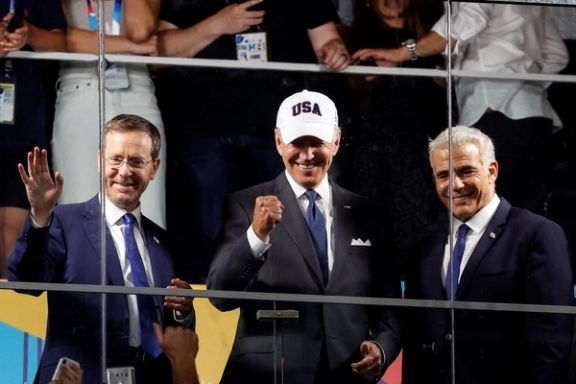
US Secretary of State Antony Biden said Friday the administration of President Joe Biden had concentrated on “rebuilding and revitalizing America’s alliances.”
Speaking at a press briefing, Blinken said the US was working alongside “the many countries that share our fundamental interests and values.” In the Middle East he cited Saudi Arabia, Egypt, Bahrain, Morocco, and Israel. Blinken extended “congratulations to Prime Minister [Benjamin] Netanyahu on announcing the formation of a new government.”
Netanyahu's relations with the Biden Administration was not as close as his friendship with former President Donald Trump and tension with Palestinians could spike because of the influence of religious parties in his government.
“Nato has never been stronger or more united,” Blinken said. “We doubled the number of battlegroups along Nato’s eastern flank…the Russian war machine is in dire straits.”
Both Iran and Russia, Blinken said, shunned diplomatic solutions. “We have to see some meaningful evidence that Russia is prepared to actually negotiate and negotiate,” he said.
Blinken acknowledged Iran had abided by its commitments under the 2015 Iran nuclear agreement, the JCPOA (Joint Comprehensive Plan of Action), until the US in 2018 left the JCPOA. But he attributed the failure of talks aimed at reviving the JCPOA solely to Iran not being “willing or able to do what’s necessary.”
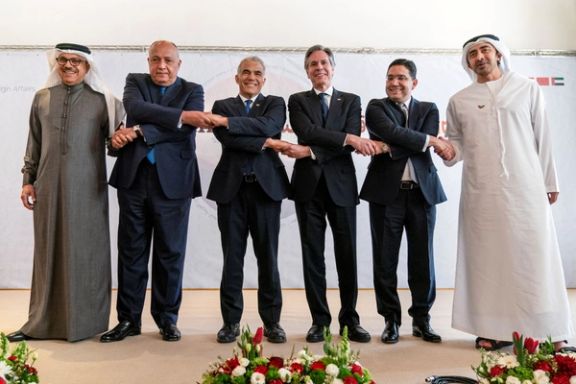
With growing talk in Washington and Tel Aviv of a ‘military option’ against Iran, Blinken noted the challenges the US faced in downsizing its Middle Eastern military presence.
Marginal events, significant developments
David Barnea, head of Mossad, at the Israel’s intelligence agency awards Thursday, attacked the 2015 Iran nuclear agreement as “absurd” and looked forward to a government in Tehran that was as close to Israel as was the Pahlavi Shah before the 1979 Revolution.
A review of “significant regional developments…including the current situation in Iran” was the center of Friday’s virtual meeting between US National Security Advisor Jake Sullivan with Israeli National Security Advisor Eyal Hulata, according to a White House statement. Given their “shared commitment to countering Iran’s threats to the region,” the officials “discussed the broad array of economic sanctions imposed in recent months against Iran” and “reviewed ongoing cooperation and exercises between the US military and Israel Defense Forces.”
Gabi Portnoy, an Israeli cybersecurity official, dismissed as a “marginal event” the hacking of Israeli security footage of a bombing in Jerusalem November – attributed to an Iranian hacktivist group ‘Moses Staff.’ In remarks reported by the Times of Israel Friday, Portnoy said Israel security agencies “didn’t do the minimum required.”
Artificial intelligence, unmanned vessels
In a press briefing Thursday, General Michael Kurilla, Commander of the US Central Command - which covers the Middle East and which has included Israel for a year – said adversaries would be combatted both by “values-based relationships” and the military use of artificial intelligence, including “unmanned systems...[like 100 naval] surface vessels and undersea vessels.”
The US had a “very strong military-to-military relationship” with Saudi Arabia, Kurilla said, exemplified by his discussion that morning with General Fayyad Al-Ruwaili, the Saudi chief of staff. Egypt, Kurilla noted, had a “large, modern, and powerful military” due in part to US training and equipping over 30 years.
“We’ve got to cultivate deep, abiding partnerships that can serve as a hedge against threats in the region while deterring Iran from its worst, most destructive behavior,” the CENTCOM commander said, as Tehran continued “to violate [US] sanctions,” and to “undermine regional security and stability through militia groups, ballistic missile capabilities, UAVs [unmanned aerial vehicles, or drones], and routine threats to international waterway.”